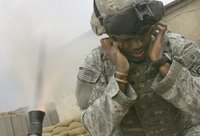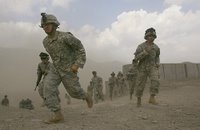War on West shifts back to Afghanistan
Militants are being drawn away from Iraq.
The conflict in Iraq is drawing fewer foreign fighters as Muslim extremists aspiring to battle the West turn their attention back to the symbolically important and increasingly violent turf of Afghanistan, European and U.S. anti-terrorism officials say.
 The shift of militants to Afghanistan this year suggests that Al Qaeda and its allies, armed with new tactics honed in Iraq, are coming full circle five years after U.S.-led forces ousted the Taliban mullahs.
The shift of militants to Afghanistan this year suggests that Al Qaeda and its allies, armed with new tactics honed in Iraq, are coming full circle five years after U.S.-led forces ousted the Taliban mullahs.
 Insurgent leaders in Iraq are now mainly interested in foreign recruits ready to die in suicide attacks, anti-terrorism officials say. Moreover, the conflict is dominated by violence between Sunni and Shiite Muslims. In contrast, an accelerating Afghan offensive by the resurgent Taliban offers a clearer battleground and a wealth of targets: U.S. and other North Atlantic Treaty Organization troops, and the Western-backed government.
Insurgent leaders in Iraq are now mainly interested in foreign recruits ready to die in suicide attacks, anti-terrorism officials say. Moreover, the conflict is dominated by violence between Sunni and Shiite Muslims. In contrast, an accelerating Afghan offensive by the resurgent Taliban offers a clearer battleground and a wealth of targets: U.S. and other North Atlantic Treaty Organization troops, and the Western-backed government.
Pierre de Bousquet de Florian, director of the DST, France's lead counter-terrorism agency, says that as Iraqis have solidified control of their insurgency, the movement of foreign fighters to Iraq hasMuslim extremists from North Africa make the odyssey to Afghanistan through routes that converge in Pakistan, another senior French anti-terrorism official said.
"There's a new route along which [North Africans] pass through Peshawar and down into Afghanistan to carry out operations," the senior anti-terrorism official said. "And what's new is the suicide operations. That's not at all part of the Afghan mentality."
Louis Caprioli, who retired as chief of the DST's anti-terrorism division in 2004 says North Africans have been detected traveling to Koranic schools in Quetta and Peshawar. The fighters use the schools as covers for their presence in Pakistan and as staging areas to cross into Taliban-dominated areas of Afghanistan. Foreign fighters are predominantly Sunni. They increasingly prefer fighting alongside the Taliban to getting embroiled in the Sunni-versus-Shiite bloodshed in Iraq. Caprioli said,It is said that militants from as far as away as the Caribbean island of Trinidad, which has a large number of residents of South Asian origin, had traveled to Afghanistan via South Africa.
Sayed Anwar, who recently served as deputy chief of the Afghan Interior Ministry's counter-terrorism branch.
The conflict in Iraq is drawing fewer foreign fighters as Muslim extremists aspiring to battle the West turn their attention back to the symbolically important and increasingly violent turf of Afghanistan, European and U.S. anti-terrorism officials say.
 The shift of militants to Afghanistan this year suggests that Al Qaeda and its allies, armed with new tactics honed in Iraq, are coming full circle five years after U.S.-led forces ousted the Taliban mullahs.
The shift of militants to Afghanistan this year suggests that Al Qaeda and its allies, armed with new tactics honed in Iraq, are coming full circle five years after U.S.-led forces ousted the Taliban mullahs. Insurgent leaders in Iraq are now mainly interested in foreign recruits ready to die in suicide attacks, anti-terrorism officials say. Moreover, the conflict is dominated by violence between Sunni and Shiite Muslims. In contrast, an accelerating Afghan offensive by the resurgent Taliban offers a clearer battleground and a wealth of targets: U.S. and other North Atlantic Treaty Organization troops, and the Western-backed government.
Insurgent leaders in Iraq are now mainly interested in foreign recruits ready to die in suicide attacks, anti-terrorism officials say. Moreover, the conflict is dominated by violence between Sunni and Shiite Muslims. In contrast, an accelerating Afghan offensive by the resurgent Taliban offers a clearer battleground and a wealth of targets: U.S. and other North Atlantic Treaty Organization troops, and the Western-backed government.Pierre de Bousquet de Florian, director of the DST, France's lead counter-terrorism agency, says that as Iraqis have solidified control of their insurgency, the movement of foreign fighters to Iraq has
. . . significantly declined in recent months. . . There is less need for them in Iraq, because there's a need above all for kamikazes and there are not an infinite number of volunteers. The Iraqi insurgency is now very well organized around Iraqis…. Those who want to fight, but not necessarily to die as martyrs, go elsewhere.
Today they return to the route of Afghanistan, or the tribal zones of Pakistan, where clearly they are thriving. Certainly there are some Europeans, but very few. In contrast, in Afghanistan there are certainly many Pakistanis and people from Arab countries and some from North Africa.
Clearly, methods have been transposed in Afghanistan that did not exist during previous wars in Afghanistan. Like suicide attacks. And that's directly influenced by what's happening in the Middle East, in Iraq.
"There's a new route along which [North Africans] pass through Peshawar and down into Afghanistan to carry out operations," the senior anti-terrorism official said. "And what's new is the suicide operations. That's not at all part of the Afghan mentality."
Louis Caprioli, who retired as chief of the DST's anti-terrorism division in 2004 says North Africans have been detected traveling to Koranic schools in Quetta and Peshawar. The fighters use the schools as covers for their presence in Pakistan and as staging areas to cross into Taliban-dominated areas of Afghanistan. Foreign fighters are predominantly Sunni. They increasingly prefer fighting alongside the Taliban to getting embroiled in the Sunni-versus-Shiite bloodshed in Iraq. Caprioli said,
There are a certain number of foreign jihadis who aren't interested in massacring Shiites. In Afghanistan, you have NATO troops to fight as well as Americans, all the 'crusaders.'
Sayed Anwar, who recently served as deputy chief of the Afghan Interior Ministry's counter-terrorism branch.
I think this is true that they are shifting Al Qaeda suicide attackers from Syria, and not only Syria but other countries like it, from other parts of the world, to Afghanistan through Iran and Pakistan and countries like that.

0 Comments:
Post a Comment
<< Home